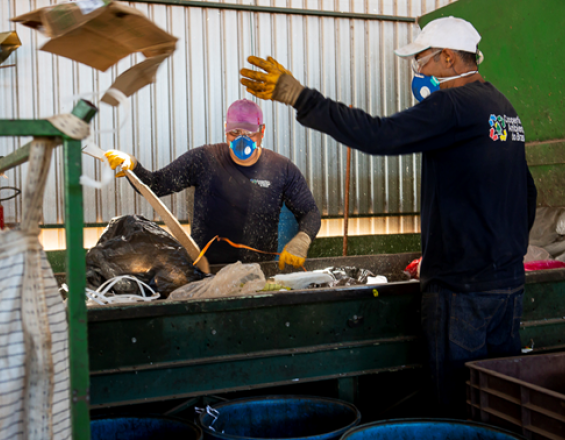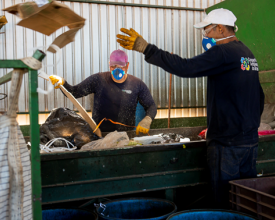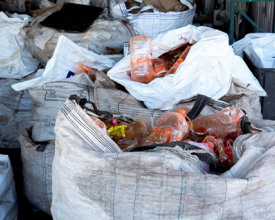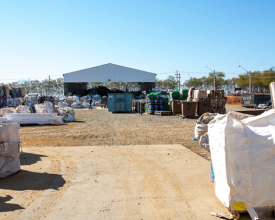
Brazilian Recycling Professionals Cooperative

Since 2001, Cooperlínia has been dedicated to waste management, uniting citizenship, work and income, through recycling, with the hiring of recyclers, street dwellers and those sentenced in the semi-open system. The unit was the first in the sector to obtain ISO 14001 Social Responsibility Certification, which demonstrates the concern of all those involved in providing social welfare through sustainability and cooperativism. The cooperative's values include social inclusion, training and professional benefits, such as paid leave, Christmas bonus, the Members' Guarantee Fund (FGS), dental, transportation and food agreements. The cooperative has a partnership with Universidad Pontificia Católica (PUC), and is developing a digital administrative and financial management system and the Integrated Management System for Recycling Cooperatives (SIGESCOOP).
Context
Challenges addressed
Since its foundation, the cooperative has received strong private support; however, it was observed that even with the advancement of private sector participation, society and the public power need to play their role and participate more effectively. From an internal perspective, Cooperlínia began its work to develop strategic relationships, exchanging experiences and helping them in their competencies. With the public authorities, relations have been much closer, since for the collection to take place correctly, the municipality needs to meet several technical requirements, such as having in its management plan the initiative for selective collection, the implementation of collectors in the municipality, having adequate logistics and disseminating it so that the population can offer its waste properly. This was a reality for a long time in Paulínia/SP, which helped Cooperlínia to mature and strengthen its management system.
Location
Process
Summary of the process
The three basic components interact with each other in order to encourage and improve activities related to solid waste, more specifically with the issue of selective collection. First, the structuring of a cooperative of recyclers of recyclable materials is extremely necessary and important for the successful implementation of selective collection. Cooperlínea provides this example in a quite satisfactory way, since the cooperative configuration brings many benefits to the workers and, therefore, makes the work in this field more attractive. Consequently, the participation of the public and private sector is essential for the smooth running of solid waste activities. With technical and financial support, the topic becomes interesting and relevant for the municipality, making the cooperatives strategic agents for the proper functioning of municipal selective collection. Finally, the improvement of the processes and tools used within the cooperative allows better results to be achieved, as is the case of SIGESCOOP, the digital system that is being developed.
Building Blocks
Structuring/ formalization of the cooperative
The cooperative has a differentiated management format formalized by an administrative council, formed by a board of directors with 3 directors, and a fiscal council, aimed at assisting the financial processes of Cooperlínea. In addition, the cooperative defined in assembly a career plan for the collaborators, thus establishing different positions and remunerations according to each function exercised in the cooperative. With this, benefits for employees were also defined, such as life insurance, member guarantee fund, paid breaks, Christmas bonus and professional training.
Enabling factors
For the emergence of new cooperatives and/or for the success of existing ones, the participation of other sectors and associations is important so that adequate income can be generated for the cooperative and its collaborators. In addition, it is necessary that the issue of solid waste be discussed in the municipalities, and with this, the need for both waste separation and selective collection arises and, therefore, the structuring of cooperatives and workers involved in this issue.
Lesson learned
Since this work depends on factors such as the performance of selective collection and the supply of this material to the cooperative, the processes are not always carried out in a planned manner, nor are the payments for these services. This ends up being an obstacle for the proper functioning of the cooperative and directly affects the workers' remuneration.
To achieve better results and also improve the working conditions of the workers, it is always necessary to improve the technologies used for waste separation, for example, the mechanization of the mats at the time of waste separation.
Integration between the public and private sectors
In order for the solution to fulfill its role in collaboration with the National Solid Waste Policy (PNRS), it is necessary to articulate the public and private sectors so that new business models can be produced.
For this, it is necessary to identify the local scenario in which the activities are incorporated (legislation, environmental education, modal collection system, selective collection, operational structure of segregation, political context, public policies, among others).
It also makes it necessary to create an action plan, involving all the actors with direct competencies in the feasibility of a selective collection system in the municipality. Identify the leaders who have the power to transform, either by holding a position with decision-making power or by their actions in the community.
Enabling factors
Articulation and participation of the public and private sectors regarding selective collection, to encourage and generate opportunities in relation to the issue of urban solid waste.
Diagnosis in relation to environmental components, such as selective collection, final destination and legislation in this context, of the municipalities in which new activities are intended to be carried out. Thus, there is a macro vision of the needs and opportunities in each region.
Lesson learned
At its foundation, the cooperative had strong private support, but it was concluded that only the participation of this sector was not enough, society and the public power needed to play their role and participate more effectively. So, in addition to the internal, Cooperlínia began its work of developing strategic relationships, exchanging experiences and helping them in their competencies.
SIGESCOOP - Integrated Management System for Recycling Cooperatives
Among the differentials of the cooperative's success is the digital system that is being developed for the management of administrative, financial and operational control. SIGESCOOP allows the monitoring of the entire operation of the cooperative, control of the stock of materials, gravimetry, production by cooperative, among other functionalities that are currently performed in spreadsheet format.
To use the system strategically, to approach the relations with its stakeholders and to support to contribute to the maximum for an integrated waste management.
Enabling factors
The acquisition of the system facilitated all recorded operations, the flow of information and monitored activities. The integrated management of all areas, helping decision making with the use of dashboards, as it allows visualizing each task to be executed in the cooperative.
In this way, a control panel makes it possible to visualize what is being done in each department: this allows a broader view of the business and facilitates the control of processes and whether the goals will be achieved in each period.
Lesson learned
The system is still in the development phase, so lessons learned in relation to SIGESCOOP have not yet been identified.
Impacts
The cooperative works towards sustainability goals. It also promotes activities that reflect directly on the environment, since it is not only concerned about recyclable waste, but also in having associates who act by joining efforts to ensure the integrated management of solid waste. The training of the internal team and associates, and even public management, is one of the actions promoted by the cooperative. This approach with the stakeholders makes the "waste cycle" in the regions where it develops some kind of activity to be better executed, which directly reflects in the positive impacts caused in the community. The cooperative understands the competencies of each one in the "waste cycle" and works efficiently with these relationships, using this as an important differential for the success of its management and the expected results. The city of Paulinia/SP, currently does not reach 5% of the selective collection potential, generating today an average of 100 t/month of recyclables, and 45 direct jobs (20 associates and 25 prison inmates), in addition to benefits that can hardly be found in other cooperatives. The package of benefits offered by Cooperlínia has attracted the attention of other cooperatives and public managers interested in the model for their municipalities.
Beneficiaries
-
Recyclers, street dwellers and convicts in the semi-open system;
-
Local community;
-
Public sector, supervisory bodies and environmental committees;
-
Other cooperatives and third sector;
-
Private sector.
Story
In 2000, the city of Paulínia, in the state of São Paulo, implemented its sanitary landfill, which gave rise to the need to implement a waste sorting unit. At that time, one of the founders, Mr. Jose Carlos, met Mr. Antonio who had a life history marked by a health problem from working on farms. Mr. Antonio had to move away from farming and found his source of income by collecting and selling aluminum cans. It was then that the partners joined forces to create the sorting unit and Cooperlinia Ambiental do Brasil was born. Mr. Antonio was one of the first cooperators since the beginning of the cooperative, he brought his experience of collection and valorization of the material, due to his meticulous separation of the electronic components such as metal, lead, aluminum, etc. Today he is an icon of the cooperative, he works with joy and says that health also comes from having his head busy with work. The benefits offered by the cooperative model contribute to the quality of life, professional qualification and health of all cooperators.
The solutions that Cooperlínia has developed in its 19 years of activity can be replicated for any recycling cooperative, and any municipality, for this to happen the first step is to evaluate the scenario in which the activities will be incorporated.




